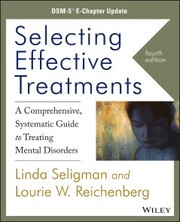Detailansicht
Selecting Effective Treatments
eBook - A Comprehensive, Systematic Guide to Treating Mental Disorders, DSM-5 E-Chapter Update
ISBN/EAN: 9781118739655
Umbreit-Nr.: 9215165
Sprache:
Englisch
Umfang: 40 S., 5.59 MB
Format in cm:
Einband:
Keine Angabe
Erschienen am 04.09.2013
Auflage: 4/2013
E-Book
Format: PDF
DRM: Adobe DRM
- Zusatztext
- <p>The DSM-5 material in this e-chapter update provides a bridge between DSM-IV-TR and DSM-5. Professors, students, clinicians, and others interested in mental health diagnosis and treatment will find all of the information they need to smoothly transition to the new DSM-5.</p><p>The e-chapter update provides all of the DSM-5 changes organized by disorder, so that readers can easily and completely adopt the new DSM-5 material. Many of the disorders in DSM-5 remain largely unchanged from DSM-IV-TR. This, too, is noted in an effort to provide consistency and clarity between the 4th edition, and the DSM-5.</p><p>This new e-chapter update outlines the background for important changes made to DSM-5 including the elimination of the bereavement exclusion, new course specifiers for mania, a switch to the new syndrome concept for autism and schizophrenia, and many of the name changes to existing disorders (e.g., intellectual disability disorder, gender dysphoria). All of this, and more, is included in the e-chapter update to<i>Selecting Effective Treatments</i>, 4th edition.</p>
- Kurztext
- The DSM-5 material in this&nbsp;e-chapter update provides a bridge between DSM-IV-TR and DSM-5. Professors, students, clinicians, and others interested in mental health diagnosis and treatment will find all of the information they need to smoothly transition to the new DSM-5. The e-chapter update provides all of the DSM-5 changes organized by disorder, so that readers can easily and completely adopt the new DSM-5 material. Many of the disorders in DSM-5 remain largely unchanged from DSM-IV-TR. This, too, is noted in an effort to provide consistency and clarity between the 4th edition, and the DSM-5. This new e-chapter update outlines the background for important changes made to DSM-5 including the elimination of the bereavement exclusion, new course specifiers for mania, a switch to the new syndrome concept for autism and schizophrenia, and many of the name changes to existing disorders (e.g., intellectual disability disorder, gender dysphoria). All of this, and more, is included in the e-chapter update to Selecting Effective Treatments, 4th edition.
- Autorenportrait
- <p><b>Linda Seligman</b> was<i>professor emeritus</i> at George Mason University, where she was director of the doctoral program in education and in charge of the Community Agency Counseling Program. She also taught at Johns Hopkins, Walden University, and Marymount University. A prolific author, she published more than eighty books, book chapters, and professional articles. Past president of the Virginia Mental Health Counselors Association, Seligman was editor of the<i>Journal of Mental Health Counseling</i> and also served on the editorial boards of the<i>Journal of Counseling and Development</i> and the<i>Virginia Counselors Journal</i>. She was selected as a Distinguished Professor by George Mason University and, in 1990, was named Researcher of the Year by the American Mental Health Counselors Association, which presented her with the Counselor of the Year Award in 2008.</p><p><b>Lourie W. Reichenberg</b> is in private practice in Falls Church, Virginia. Her practice includes people with a broad range of concerns and mental disorders, notably adjustment, mood, and anxiety disorders. Reichenberg has a particular interest in working with people who have lost family members to suicide, people in crisis, and as a part of the treatment team for people with bipolar disorder. In addition to individual and couples counseling, she also provides workshops and educational programs to community governmental and mental health agencies and also offers training and supervision to people seeking licensure as counselors, as well as to practicing clinicians.</p>
